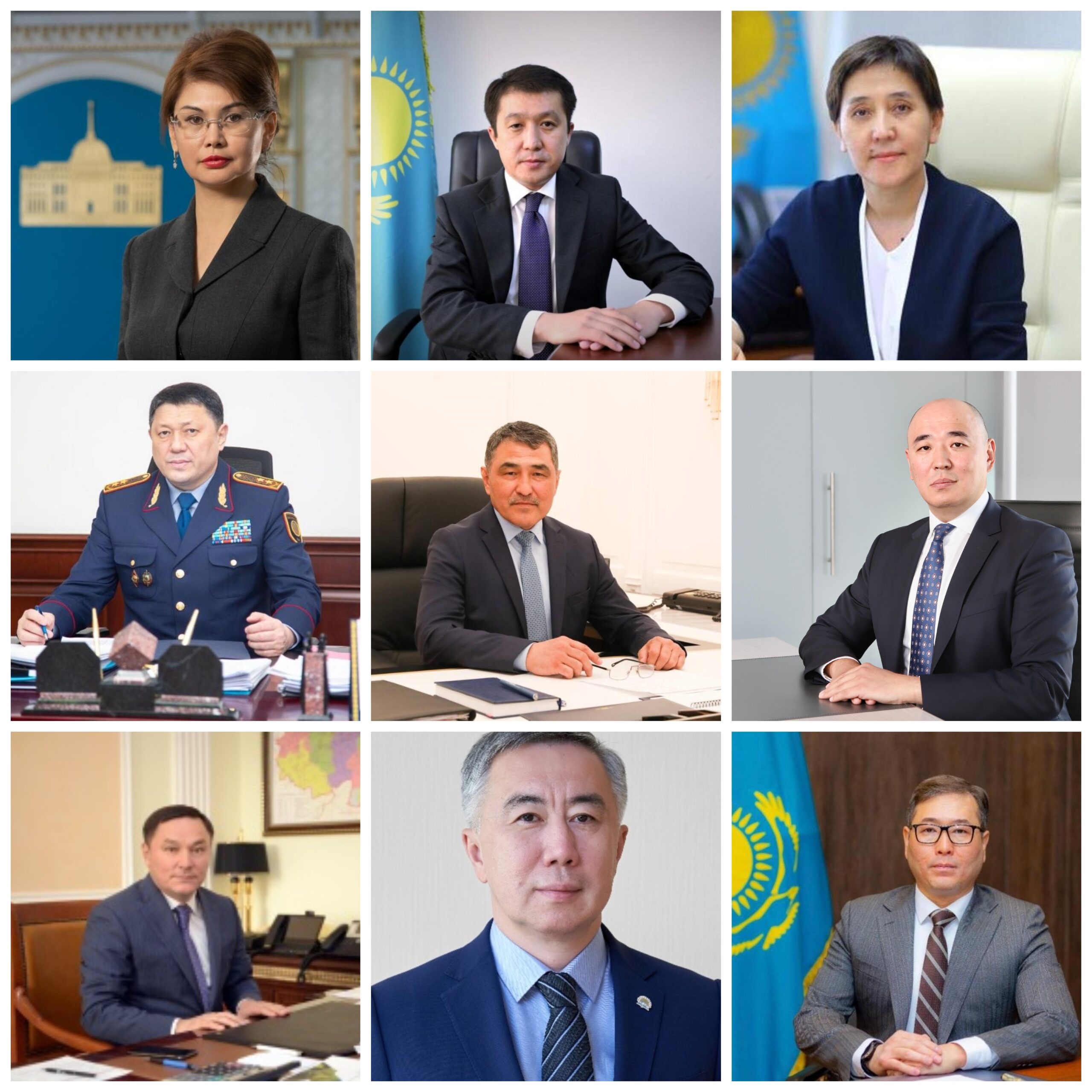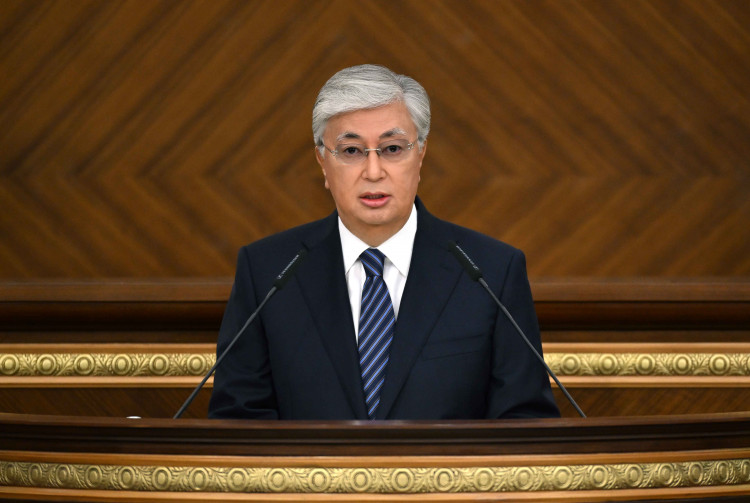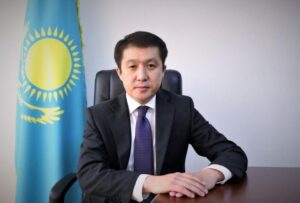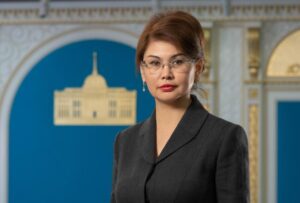ASTANA – Following President Kassym-Jomart Tokayev’s state-of-the-nation address on Sept. 1, Kazakhstan has undergone a significant government reshuffle, including the establishment of new ministries. These changes aim to address urgent challenges and propel the nation’s developmental trajectory.

Most of the new ministers have a long experience in the government. Collage designed by The Astana Times.
The state-of-the-nation address is an important event that sets the political agenda for Kazakhstan, including the country’s development. This was the sixth such address Tokayev has delivered since he took office in 2019, with two addresses delivered last year – in March after the tragic January events and in September.
Tokayev’s latest address focused on economic matters that had been sidelined in government activities, criticizing poor agricultural development, inadequate economic diversification, and lackluster implementation of presidential initiatives.
New ministries
In his address, Tokayev announced the creation of two new ministries – the Ministry of Water and Irrigation and the Ministry of Transport.
“Water resources are no less important for our country than oil, gas, or metal,” said Tokayev, emphasizing that Kazakhstan may face a water shortage of 12-15 billion cubic meters by 2040.

Tokayev delivers his address on Sept. 1. Photo credit: akorda.kz
Water scarcity poses a significant challenge for Kazakhstan as the country grapples with limited water resources amid a burgeoning population, expanding industrial production, and ongoing infrastructure development.
Transportation is another critical sector for Kazakhstan. Although the Ministry of Transport and Communications existed until 2014, its importance has been revived.
As Kazakhstan aims to establish itself as a regional transport hub, the newly reconstituted Ministry of Transport will be tasked with unlocking the nation’s full potential in transport and logistics—a sector President Tokayev considers to be of “strategic importance,” especially in the context of evolving geopolitical developments.
Specifically, it will oversee a broad range of sectors, including railways, roads, inland water transport, commercial navigation, civil and experimental aviation activities, as well as natural monopolies in air navigation services and airports. It will also regulate public markets in the field of airport services and manage highways.
President Tokayev said, “we are witnessing the emergence of a new global economic geography.”
“Trade flows from China to Europe, Russia, Central Asia, and back are expected to grow rapidly. Given this context, the transportation and logistics industry should become a cornerstone of the country’s economic development. In a competitive environment, it is vital to promptly address this industry’s key issues,” he noted.
In light of the newly-formed ministries and some functions being redistributed, there are now five restructured ministries in Kazakhstan. In addition to the two new ministries—Water and Irrigation and Transport—these also include the Ministry of Industry and Construction, the Ministry of Culture and Information, and the Ministry of Tourism and Sport.
Series of reshuffles
On Sept. 2, President Tokayev signed several decrees, setting in motion significant government reshuffles that many in Kazakhstan had anticipated.

Karabayev began his career in 2011 as an acting expert of the administration for the operation and development of networks of water facilities at the Ministry of Agriculture. Photo credit: gov.kz
Marat Karabayev was relieved of his duties as the Minister of Industry and Infrastructural Development, a position he had held for less than two years. On Sept. 4, he was appointed as the new Minister of Transport. Karabayev, a 36-year-old statesman, graduated with honors from the University of Warwick in 2010, where he majored in production and systems engineering.

Nurzhigitov has been working in different positions in the Zhambyl Region since 1991 before becoming the region’s governor in April 2022. Photo credit: gov.kz
Nurzhan Nurzhigitov, aged 56, was named the new Minister of Water Resources and Irrigation on Sept. 4. Prior to this appointment, he served as the governor of the Zhambyl Region. He had previously led various agriculture and natural resources departments in that region.
Darhan Kydyrali was removed from his role as Minister of Information and Public Development.
On Sept. 2, Aida Balayeva, 49, was appointed the new Minister of Culture and Information. Previously serving as the deputy chief of the Presidential Administration, she brings a wealth of experience in public service and is among the few women in the upper ranks of government.

Balayeva holds degrees in law and Russian language and literature. Photo credit: akorda.kz
Askhat Oralov and Zulfiya Suleimenova were relieved of their ministerial roles. The two had made headlines in January 2023 when they became the youngest ministers ever appointed in Kazakhstan.
Yermek Marzhikpayev, a 54-year-old Kazakh politician, was named the new Minister of Tourism and Sports. Having served as the governor of the Akmola Region since 2019, he is a native of the region and holds degrees in finance, law, and pedagogy.
Aydarbek Saparov, 57, took on the role of the new Minister of Agriculture. Prior to this, he had served as the governor of the North Kazakhstan Region since December 2022. Saparov began his career in 1985 as a state farm accountant.

Zhakupova served as vice minister in different years. Photo credit: primeminister.kz
Tamara Duissenova was appointed Deputy Prime Minister, marking a rare instance of a woman occupying such a high-level government position. She had previously served as the Minister of Labor and Social Protection since April 2022. Svetlana Zhakupova succeeded her as the new minister after serving for less than three months as the Ombudsperson for the Rights of Socially Vulnerable Categories. There are now four women in the Kazakh government, including Minister of Health Azhar Giniyat.
Serik Zhumangarin, 54, was appointed Deputy Prime Minister, a role he held concurrently with his position as Minister of Trade and Integration since 2022. Before entering public service in 2004, Zhumangarin had a career in business. Over the years, he has served as Vice Minister of National Economy and headed the Agency for the Protection and Development of Competition. In his new capacity, he will oversee trade policy, the agro-industrial complex, land relations, and Kazakhstan’s cooperation with the Eurasian Economic Union and the World Trade Organization.
Arman Shakkaliyev, 46, succeeded Zhumangarin as Minister of Trade and Integration. His main task will be to expedite the ministry’s efforts in finding new markets for Kazakhstan’s exports, as President Tokayev directed him during a meeting on Sept. 4.

Shakkaliyev was born in 1977 in Balkhash, the Karagandy Region. Photo credit: gov.kz
Yerzhan Sadenov, 55, was appointed as the new Minister of Internal Affairs, replacing Marat Akhmetzhanov. Sadenov hails from the East Kazakhstan Region and holds degrees from East Kazakhstan State University and the Karagandy Academy of the Ministry of Internal Affairs. He began his career in law enforcement agencies in 1993.
On Sept. 4, Kanat Sharlapayev was appointed the new Minister of Industry and Construction. Prior to this role, he served as the chairman of the Baiterek national holding. At 42, Sharlapayev brings a wealth of experience from the private sector, having held high-ranking positions in Citi offices across the United Kingdom, United Arab Emirates, Russia, and Kazakhstan.
Timur Suleimenov, who formerly served as the deputy chief of the presidential administration, was named the National Bank Governor. Aged 45, Suleimenov is an alumnus of Pavlodar State University, graduating in 2000. He also earned a degree from the University of Maryland in 2002, thanks to a Bolashak presidential scholarship.
On Sept. 5, Tokayev signed a decree appointing Erlan Nysanbayev new Minister of Ecology and Natural Resources. Previously, he held the position of advisor to the Astana Akim (mayor) on greening issues.
